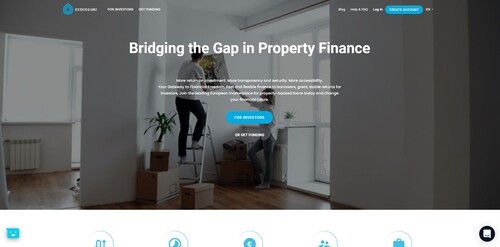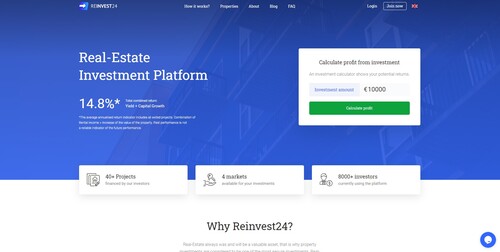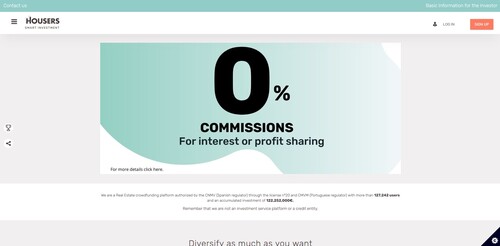P2PIncome | A Comparison of P2P Lending & Real Estate
One of the biggest differences between investing in peer-to-peer lending and real estate is that real estate is going to cost a significantly larger amount of money. Whether it's a small one room rental on the outskirts of a capital city or a two story house in the countryside, real estate costs a lot of money.

It's not only a lot of money to purchase, but to also maintain. Purchasing property without the means to sustain it turns the property into more of a liability than an asset. If done correctly, real estate as an investment can be the safest form of investing. It not only generates a source of income, but it also retains and potentially grows in value.
EstateGuru
EstateGuru was founded in 2013 in Estonia. They offer direct investments structured loans for peer-to-peer real estate lending. Investing on EstateGuru requires a 50 EUR deposit and 250 EUR in order to utilize their auto-investing tool. EstateGuru is open to investors around the world who have access to a European bank.

EstateGuru is currently the biggest peer-to-peer lending platform in Europe that deals with real estate. EstateGuru's marketplace offers a wide variety of real estate loans, such as: development loans, mortgage loans, renovation loans and property business related loans. All loans are backed by either first or second ranked mortgages and all properties are found in Europe.
Registration and verification is rather a quick process. After submitting documents, it will take 2 - 4 business days to be fully verified. Investing as a business can be a far lengthier process, spanning weeks based on the amount of information directly requested by EstateGuru's verification team.
ReInvest24
Investing on Reinvest24 requires a minimum deposit of a 100 EUR. In order to invest with reinvest24, it is required to have a European bank account. Reinvest24 is a relatively new peer-to-peer lending service that only offers loans in Europe, mainly in their home country of Estonia. However, Reinvest24 plans to expand while maintaining their business model thath prioritizes quality over quantity.

Their marketplace is rather small and there are only a limited number of loans investors can choose from. That being said, Reinvest24 has a very attractive track record, very profitable, very successful in fund recoveries and yields their investors over 14%.
Registering with Reinvest24 is a very smooth process. After submitting documents for verification it takes up to a few days to verify the account. It takes a little longer for a business account, but less hassle than most platforms, per our experience.
It's also very easy to get in-touch with the CEO and get a direct answer to any inquiry you might have, which is a huge plus.
Housers
Housers is a European real estate lending platform. Housers is not nearly as successful as EstateGuru or Reinvest24, but they do still offer attractive investments for those who are familiar and knowledgeable of P2P real estate lending markets. Minimum entry deposit on Housers is 50 EUR and interest rates vary from 5 - 18%. Housers is open to anybody with a European bank account.

Housers has a rather sloppy track record. They have been decreasing in profitability for their investors since their inception. Many investors find themselves with their loans defaulted and the collateral which is supposed to protect principal is often not enough, or has an LTV value that is way too low, and so there isn't enough money to reimburse unsuccessful investors.
Housers is very transparent and in its beginning, started off as a profitable platform. Unfortunately, they seemed to have lost the vision they once had.
An Overview of Property & Peer-to-Peer
Property
Another way of thinking about property, is that you are purchasing a set amount of currency. If you buy an apartment at 90,000 US dollars, then you can sell that apartment, at the very least, for 90,000 US dollars and would be justified in doing so. Property depreciates at a low rate of about 3.5% a year, which is set by the IRS. Even though the value of the building itself may depreciate, it is likely that the value of property will increase by greater margins. For example, in the city of New Delhi in India, property prices rose up by 38% each year from 2010 to 2020, reported by the Economic Times.
Rental income varies on the price paid for the property and the amount it can be rented for. In general, rents can range from 2 - 10% of the amount the apartment cost.
Property is without a doubt a long term strategy. Some experts would suggest renovating and flipping homes as another approach to real estate investing, but that's more of a full time job. And undertaking such a task requires skills and experience that are not readily available. For example, you can outsource such tasks, like renovating, plumbing, and carpentry, but these jobs still require a large degree of oversight.
Peer-to-Peer Lending
Peer-to-Peer lending, on the other hand, starts at incredibly low investment entries. Generally 20 - 50 dollars is what one can expect. Yearly return on peer-to-peer lending rage from 4 - 30%, depending on the level of risk an investor decides to pursue.
Peer-to-Peer lending is essentially lending money either directly to borrowers, or lending organizations called loan originators. Peer-to-Peer lending itself is not an asset class, rather, it's a method of investing into different asset classes through the use of financial technologies and microfinance.
P2P lending utilizes the inter-connectivity found on the internet, through smart phones, and facilitates a lending/borrowing ecosystem to establish its network. Because of these innovations, platforms can easily and legally provide people the ability to lend their money to other people. The enticing feature here being that you don't need much to start with. Unlike real estate, which requires much more capital.
You can imagine lending out your money is like investing in somebody else. You offer your money to someone else in hopes that what they can do in the meantime can not only pay you back but it also compensates you with interest.
Risks and Differences
It's worth noting those who seek loans from P2P platforms are most likely doing it because they may have no other way of acquiring capital. This means the banks rejected their loan applications, and that is not a negligible detail, as it warrants concern. That being said, sometimes these reasons are a factor of location. For instance, someone born in a country like Albania, and due to a form of country profiling, the borrower becomes high risk.
More often than not, on peer-to-peer lending, loans are paid back. Yet, there are platforms that fail to properly ensure that their borrowers pay back their dues.
The main distinction to be drawn between P2P and real estate is that real estate is something real, it's tangible. If you can't find a tenant, you can live in it. It's space and something that is essential for human life. This has what we call "value". The truth is, peer-to-peer finance is easy, affordable and profitable, but it lacks what you're going to find in real legacy markets: Value.
Solutions in Peer-to-Peer Lending with Collateralized Real Estate
Luckily for us, there is a combination of the two: P2P Real Estate Lending platforms. Platforms that offer investors a chance to invest in their borrowers who are only dealing with real estate. There are platforms who sell real estate loans and offer up the borrowers real estate as collateral. Which means, if the borrower can't pay, then the investor holds partial ownership in the property that was collateralized.
This solution fixes the problem of defaulting borrowers by merging the value factor of investing into real estate.
There are actually many different forms of P2P real estate investing. Platforms like EstateGuru offer investors the chance to invest into projects that borrowers need credit to complete, which is very commonplace for real estate development companies. Platforms like Reinvest24 offer real estate equity for investors until the end of their loan contract. This allows investors to enjoy rental income from their investment into real estate.

Market Type
Mortgage Loans
Average Returns
8 - 13%
Minimum Investment
EUR 50
Signup Bonus
0.5%
Registered users
150,000
Total funds invested
EUR 700 Million
Default rate
6%
Regulating entity
Bank of Lithuania
Buyback guarantee
Secondary market
Payment methods
Bank Transfer, SEPA, Credit Card, TransferWise
Withdrawal methods
Bank Transfer, SEPA, Credit Card, TransferWise
EstateGuru is a highly recognized and successful P2P Lending company. What makes EstateGuru as P2P Lender so profitable and secure? Explore the breakdown with P2PIncome's thorough analysis of EstateGuru's strengths and weaknesses.

Market Type
Mortgage Loans
Average Returns
12 - 17%
Minimum Investment
EUR 100
Signup Bonus
EUR 10
Registered users
25,000
Total funds invested
EUR 40 Million
Default rate
0%
Regulating entity
Self-Regulated/EU Compliant
Buyback guarantee
Secondary market
Payment methods
Bank Transfer, Bank Card, TransferWise
Withdrawal methods
Bank Transfer, Bank Card, TransferWise
Reinvest24 is an equity backed real estate rental P2P lender. Though they are a much smaller P2P lending platform in comparison to the top P2P lenders. They deserve a high place on the list because of their attention to detail and successful execution of business goals.

Market Type
Mortgage Loans
Average Returns
5 - 18%
Minimum Investment
EUR 50
Signup Bonus
1%
Registered users
135,000
Total funds invested
EUR 140 Million
Default rate
32%
Regulating entity
Comisión Nacional del Mercado de Valores
Buyback guarantee
Secondary market
Payment methods
Bank Card, Bank Transfer, TransferWise
Withdrawal methods
Bank Card, Bank Transfer, TransferWise
Housers is one of Europe's largest real estate P2P lenders. They have become internationally recognized through their market choice. Housers marketplace consists of luxury properties from Italy, Spain and Portugal. Find out more in the review.
Verdict
The combination of peer-to-peer lending and real estate is incredibly powerful. To properly have faith in the money being lent there needs to be collateral. Investors need to know they have something to fall back on and borrowers need to know there is something they can lose if they fail to pay back their loans. If money is not on the line for the borrower, the deal isn't serious. In the case that the borrower decides to not pay back a loan, who's going to force the pay back? Yes, you can call the police or involve your lawyers, but at the end of the day, you don't want to deal with that.
So collateral is required for loans to be issued. Some financial institutions use income as collateral. If you borrow money from the bank, they require that you have money in your account, or a consistent stream of money to guarantee they can take money from you later.
Real estate satisfies this fear concern in P2P lending. As a matter of fact, there is no better collateral than property.
EstateGuru understands this process very well. They have provided consistent returns and never lost any of their investors' money despite being around for a long time and handling hundreds of millions in capital.



